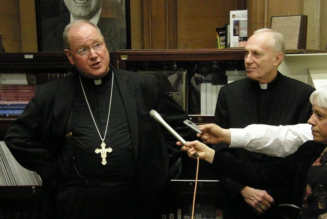
Q. I teach at a Catholic high school. I just graduated from college, so I am close in age to the students. I recently overheard a student talking to her friend about a cute jacket she was wearing, and the friend said she got it in the men’s section (the girl isn’t gay or anything, she just thought it was cute — even I sometimes wear my brothers’ old hand-me-downs). But then the girl said, “Boys can wear girl clothes, too.” Although I don’t think they should, I didn’t speak up and correct her. Another time at Halloween a girl said she dressed up “as a Playboy bunny” and again I didn’t speak up. Did I commit a mortal sin by not speaking up in these situations? Am I obligated to go back and repair the situations by speaking what I believe to be true? — Maria
We’ve all experienced this — staying quiet when we could have said something on a controversial matter of importance.
In your case, as a teacher at a Catholic high school, there is an additional reason for speaking up. Catholic schools are part of the Church’s apostolate of education. The purpose of every Catholic apostolate is to spread the redemptive love of Jesus. Catholic schools do this through education. You occupy the paradigmatic role of that apostolate: educator.
You want to know if your silence was mortally sinful. To answer with any certainty, I would need to know more details than you have given. But I can offer a basic pattern for thinking through this kind of question. It may shed some light. In the end, only you can make a final conscience judgment. If after reading my reply, you are still doubtful, I recommend that you work through the question in the confessional with a trusted priest.
Let’s look at your two scenarios. In the first, you overheard remarks suggestive of erroneous thinking about expressing gender. In the second, you overheard remarks indicating that a girl dressed in a sexually suggestive way for Halloween. You obviously believe that gender and modesty are important or you wouldn’t have asked this question. When they were addressed in your presence, you remained silent. Was your silence mortally sinful?
For a sin to be mortal it must include three things: grave matter, sufficient reflection and full consent of the will (Catechism, 1857). Grave matter means that what’s chosen — the “object” of the act — is seriously wrong; sufficient reflection means I know it’s seriously wrong prior to choosing it; and full consent means I choose it while being free not to. These are conditions for the possibility of sinning mortally and all three must be fulfilled. Let’s look at your scenarios and ask if the conditions were met.
Did your failure to speak constitute grave matter? The subjects of gender and modesty are certainly of grave importance. But did the details of the situation indicate that you had a grave duty to intervene in defense of these values?
You would have had such a duty if you had good reason to believe that an intervention was likely to prevent some serious sin and/or elicit understanding and assent to the truths at stake. You also would have had a duty if you thought your silence was likely to cause scandal. Scandal occurs when my actions cause another to sin.
If, however, intervening was not likely to do any good (if you did not have reason to believe your silence would cause scandal) and if intervening was likely to cause avoidable harms (such as the soiling of your good name on social media by vindictive students), then you had no grave duty to intervene and hence staying silent did not constitute grave matter.
But for the sake of argument, let’s say grave matter was at stake. Did you have sufficient reflection of this before adopting silence? Was silence chosen knowing or suspecting you had a grave obligation not to remain silent? Or was it more spontaneous — you froze, didn’t know what to do, went back and forth in your mind, and the opportunity passed you by?
If it was more spontaneous, then your omission did not proceed from sufficient reflection. It was not a free choice to remain silent knowing that silence was gravely wrong. And if it did not proceed from sufficient reflection, it cannot have been mortally sinful.
Similarly, you could only have met the condition for full consent to grave matter had you known it was grave matter prior to engaging in a fully voluntary omission; but if there wasn’t sufficient understanding that your duty to speak was grave, then you couldn’t meet this condition.
In my mind, it’s doubtful that any of the conditions for mortal sin were fulfilled, much less all three.
Therefore, I do not think staying silent was mortally sinful.
You ask whether you are obliged to go back and repair the situations.
Although there was likely no mortal sin, you still might have some obligation to revisit the situation.
If on reflection you conclude your silence likely caused someone to sin (i.e., caused scandal), you can make things right by repenting to the person(s) and explaining the truths that were at stake.
Moreover, if your silence led some to believe that you supported the erroneous views and/or actions under discussion, you risk undermining your credibility as a witness to the truth and ultimately to Christ. If you think this happened, you make things right by disabusing them of this false belief and explaining what you really believe.
Finally, if you have good reason to believe that revisiting the matter would lead someone to repent of error and affirm the truth, then you should revisit the questions and assist the person(s) to see the truth.
If on the other hand, you think that nobody was likely to pay enough attention to your silence to be scandalized by it, or to conclude you were sympathetic to error, and you think revisiting the matter is unlikely to cause anyone to repent, then I don’t think you have any obligation to revisit the situation. Better to prepare yourself for the next time something similar happens.
A final word on staying silent.
Although your silence likely was not mortally sinful, failing to bear witness to the truth frequently does constitute grave matter — especially when clerics stay silent on moral matters, and especially on truths pertaining to marriage and sexuality.
Our reticence is understandable. Our hearers will frequently take offense, misrepresent our words and label us all sorts of nasty things — “haters,” “racists” and various types of “phobes.” But fear shouldn’t dictate what we do.
We need to bear witness to the truth. Not in anger, although we feel angry at the trampling of our dearest held values. Since speaking in anger almost always disinclines interlocutors to accept the messages we speak, we must resist it.
If more of us said simply, “I don’t think that’s true. I think …,” people who agree but who are afraid to speak out would take heart and perhaps follow our example, and those who disagree will think twice before they kick off on some trendy anti-Christian meme.
Join Our Telegram Group : Salvation & Prosperity









